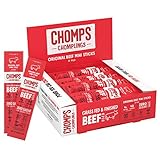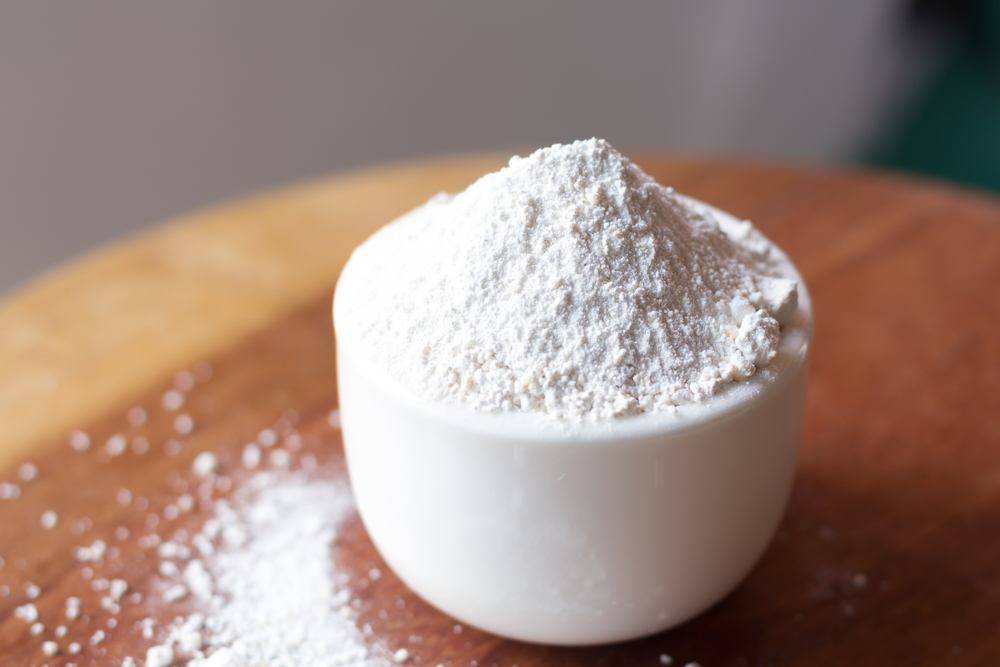Guar gum, citric acid, calcium chloride; names for food additives can seem foreign, daunting, and above-all, confusing. How can we tell if any of these additives are Whole30 friendly? Calcium chloride sounds like a chemical you might use for a science experiment, is this really a safe food additive and is it possible that it is Whole30-friendly?
Calcium Chloride is acceptable on the Whole30 diet. Although this additive, as well as guar gum and citric acid are acceptable, they aren’t enthusiastically endorsed. Additive-free foods are encouraged but it’s recognized that this isn’t always available and that some food additives do play an important role in products [1]. The best alternative to calcium chloride is acetic acid.
The main food additives to avoid while on the Whole30 include carrageenan, corn starch, monosodium glutamate (MSG), soy lecithin and sulfites. Now that we know calcium chloride is considered Whole30 approved, let’s take a deeper look at what it is and how it is used in foods as well as acceptable alternatives.
Contents
What is Calcium Chloride?
Calcium Chloride is a common food additive used for firming, anti-caking, pickling, as a preservative, stabilizer, texturizer, moisture absorber and low sodium salt. You will commonly see this additive in bottled waters, cheeses, beer, canned fruits, and vegetables, and many more. It is an inorganic compound that is on the Generally Recognized as Safe (GRAS) list by the Food and Drug Administration (FDA) for use in foods [2].
Is Calcium Chloride Safe?
Food grade calcium chloride is on the Generally Recognized as Safe list by the FDA in certain amounts. It is important to always ensure it is food-grade as other forms of calcium chloride can cause burns to mouth and throat, vomiting, stomach pain and other severe side effects if ingested.
Is Calcium Chloride Healthy?
Many prefer to avoid calcium chloride in foods for concerns over health risks. However, calcium chloride has been found to pose no significant health concern when used in trace amounts as a food additive. If ingested in large amounts, calcium chloride can result in significant side effects such as nausea, vomiting or gastric distress.
Calcium chloride does not provide any significant nutrients in foods. In larger amounts, it contains sodium but only trace amounts are used as an additive. There aren’t any significant health benefits of consuming calcium chloride when added to food products but it it not recommended to be consumed on its own.
Calcium chloride can be found in medication form as a treatment for hypocalcemia and arrythmias as well as a few other conditions. There are many different medication interactions and potential side effects of taking this medications that range from mild to severe and it should only be taken under doctor supervision.
Nutrition Facts for Calcium Chloride
Ingredients:
- Calcium Chloride
Nutrition Facts: (Per 100 grams)
- Calories 0
- Fat 0g
- Saturated fat 0g
- Sodium 320mg
- Carbohydrates 0g
- Sugar 0g
- Added sugar 0g
- Fiber 0g
- Protein 0g
Whole30 Alternatives to Calcium Chloride
Even though calcium chloride is considered a Whole30 approved additive, some may have personal reasons for wanting to steer clear. For those looking for other approved food additives that can be used in place of calcium chloride, below are some Whole30 friendly options.
Acetic Acid
Used as a sour agent in vinegar, pickled foods and sauces, acetic acid can adjust the acidity of foods that may affect flavor and texture. Acetic acid is what gives vinegar its characteristic sour taste. In fact, vinegar is diluted acetic acid with most vinegars ranging from 4-8% acetic acid content.
Ingredients:
- Acetic acid
Nutrition Facts (Per 1-teaspoon):
- Calories 0
- Fat 0g
- Saturated fat 0g
- Sodium 0mg
- Carbohydrates 0g
- Sugar 0g
- Added sugar 0g
- Fiber 0g
- Protein 0g
Sodium Citrate
Known as sour salt, sodium citrate is a salt of citric acid. It is often used in foods for flavor or as a preservative. It is a common ingredient in club soda, bratwurst, gelatin, ice cream, jams, wine and more.
Ingredients:
- Sodium Citrate
Nutrition Facts (Per 1-teaspoon):
- Calories 10
- Fat 0g
- Saturated fat 0g
- Sodium 1210mg
- Carbohydrates 0g
- Sugar 0g
- Added sugar 0g
- Fiber 0g
- Protein 0g
Guar Gum
A highly soluble gum made from guar beans, guar gum can increase viscosity of products. It also works well as a binder or thickening agent in foods such as ice cream, yogurt, gravies, condiments, sauces, puddings, cereals, and baked goods.
Ingredients:
- Guar gum
Nutrition Facts (Per ½ teaspoon):
- Calories 5
- Fat 0g
- Saturated fat 0g
- Sodium 0mg
- Carbohydrates 1g
- Sugar 0g
- Added sugar 0g
- Fiber 1g
- Protein 0g
Locust Bean Gum
Similar to guar gum, locust bean gum is a vegetable gum that works well as a thickening agent and binder in foods. Sometimes referred to as carob gum, you will often find this additive in yogurts, cream cheeses, dressings, sauces, ice cream, infant formula and more. It is gluten free and is sometimes used as an additive to provide chocolate flavoring.
Ingredients:
- Locust bean gum
Nutrition Facts (Per 100 grams):
- Calories 350
- Fat 1g
- Saturated fat 0g
- Sodium 10mg
- Carbohydrates 80g
- Sugar 0g
- Added sugar 0g
- Fiber 80g
- Protein 6g
Xanthan Gum
Another common thickener or stabilizer found in foods is xanthan gum. A type of soluble fiber, xanthan gum absorbs water to form a gel and can improve texture, flavor, consistency and even shelf life of certain products such as salad dressings, baked goods, fruit juices, soups, sauces and gravies and more.
Ingredients:
- Xanthan gum
Nutrition Facts (Per ½ teaspoon):
- Calories 5
- Fat 0g
- Saturated fat 0g
- Sodium 10mg
- Carbohydrates 1g
- Sugar 0g
- Added sugar 0g
- Fiber 1g
- Protein 0g
Lactic Acid
Often found in pickled vegetables, sourdough bread, beer, wine, kimchi, soy sauce, miso, some packaged foods and sauerkraut, lactic acid gives food a tangy flavor. It is naturally occurring in fermented foods but can also be man-made.
Ingredients:
- Lactic acid
Nutrition Facts (Per ¼ teaspoon):
- Calories 0
- Fat 0g
- Saturated fat 0g
- Sodium 0mg
- Carbohydrates 0g
- Sugar 0g
- Added sugar 0g
- Fiber 0g
- Protein 0g
Potato Starch
If you haven’t already guessed, potato starch is made from the starch of potatoes. It works well in food products as a thickener or gluten-free alternative to flour in soups, gravies, sauces, pie fillings and more.
Ingredients:
- Potato starch
Nutrition Facts (Per 1-tablespoon):
- Calories 40
- Fat 0g
- Saturated fat 0g
- Sodium 5mg
- Carbohydrates 10g
- Sugar 0g
- Added sugar 0g
- Fiber 1g
- Protein 0g
Sodium Chloride
Also known as salt, sodium chloride is most commonly used as a seasoning for foods or a preserving agent in frozen meals, canned foods and more. It is also often used to brine, cure, or preserve meats and enhance the coloring of foods.
Ingredients:
- Sodium chloride
Nutrition Facts (Per 1-tablespoon):
- Calories 0
- Fat 0g
- Saturated fat 0g
- Sodium 6976mg
- Carbohydrates 0g
- Sugar 0g
- Added sugar 0g
- Fiber 0g
- Protein 0g
Common Whole30 Approved Foods that Contain these Additives
Now that we know what additives are approved on Whole30, let’s take a look at some of them in action. Below are some common Whole30 approved food products that contain the additives mentioned above.
Chomps Original Grass-Fed Beef Sticks
 A popular snack among Whole30-ers, Chomps grass-fed beef sticks utilize lactic acid to add a tangy flavor to their meat.
A popular snack among Whole30-ers, Chomps grass-fed beef sticks utilize lactic acid to add a tangy flavor to their meat.
Ingredients:
- 100% grass-fed beef
- Water
- Sea salt
- Lactic acid
- Celery juice
- Black pepper
- Red pepper
- Garlic powder
- Coriander
- Collagen casing
Nutrition Facts (Per 1-stick):
- Calories 90
- Fat 6g
- Saturated fat 2.5g
- Sodium 290mg
- Carbohydrates 0g
- Sugar 0g
- Added sugar 0g
- Fiber 0g
- Protein 9g
Primal Kitchen Ranch Dressing with Avocado Oil
 Primal kitchen dressings utilize vegetable gums, such as guar gum and gum acacia to add viscosity to their product.
Primal kitchen dressings utilize vegetable gums, such as guar gum and gum acacia to add viscosity to their product.
Ingredients:
- Avocado oil
- Water
- Organic apple cider vinegar
- Organic distilled vinegar
- Organic gum acacia
- Organic guar gum
- Cream of tartar
- Sea salt
- Organic cage-free eggs
- Organic onion powder
- Organic garlic powder
- Organic lemon juice concentrate
- Nutritional yeast
- Organic parsley
- Organic chives
- Organic dill
- Organic black pepper
- Organic rosemary extract
Nutrition Facts (Per 2-tablespoons):
- Calories 120
- Fat 13g
- Saturated fat 2g
- Sodium 210mg
- Carbohydrates 2g
- Sugar 0g
- Added sugar 0g
- Fiber 0g
- Protein 9g
Rockit Snacks Crunchy Coated Pumpkin Seeds Nacho Flavor
 Rockit Snacks uses both lactic acid for tangy flavor and gum Arabic to help with flavor encapsulation.
Rockit Snacks uses both lactic acid for tangy flavor and gum Arabic to help with flavor encapsulation.
Ingredients
- Pumpkin seeds
- Pumpkin seed protein
- Cassava
- Potato
- Coconut
- Chicory
- Sea salt
- Onion
- Tomato
- Garlic
- Chili pepper
- Paprika
- Nutritional yeast
- Lactic acid
- Avocado oil
- Gum Arabic
Nutrition Facts (Per 1-ounce):
- Calories 150
- Fat 7g
- Saturated fat 1.5g
- Sodium 55mg
- Carbohydrates 11g
- Sugar 1g
- Added sugar 0g
- Fiber 4g
- Protein 10g
Related Questions
Is Calcium Chloride Vegan?
Yes, calcium chloride is considered vegan because it is not made using any animal products. In fact, it is often used as a coagulant in the making of tofu, a common vegan protein source.
Does Calcium Chloride Dissolve in Water?
Yes, calcium chloride is highly soluble in water. This is what makes it helpful in firming or retaining moisture of food products.
Is Calcium Chloride in Food Safe During Pregnancy?
Calcium chloride in trace amounts founds in food products is considered safe for those who are pregnant, breastfeeding or planning to become pregnant. Calcium Chloride medication should only be used if absolutely necessary during pregnancy.
